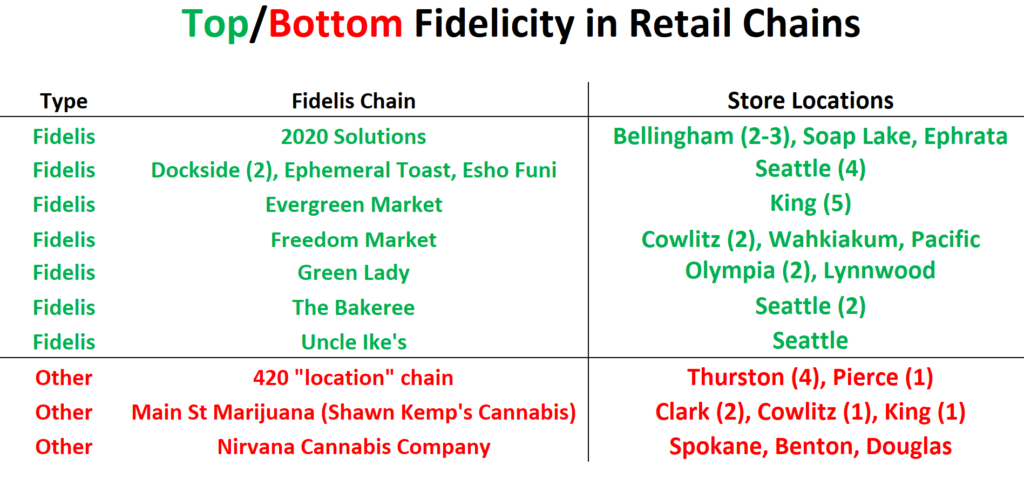As the third in my trilogy of rolling up those businesses who seem to do differential business directly or indirectly with Cannabis Testing Laboratories that I prefer (and trust), this brief post will show the rollups of individual cannabis store “Fidelicity” scores into scores corresponding to a handful of retail “chains” that I have been able to identify from either tradename similarity or LCB “True Party of Interest” violations. I have broken with the latin trend I set in the first two articles in this series by not titling this article “Fideles in Vinculis” — Fidelis in Chains seemed to have a nice ring to it and to be more “Pacific Northwest” (RIP Layne Staley).
I have very likely missed some chains in doing this work (one would be amazed how many variants on the spelling of “Mary Jane” there are, for example), but I believe I have caught most of the big ones. I also may well have missed a store or two that should be part of a chain and it is possible that I have included stores that should not be a part of the listed chain. Please know that I did my best to try to minimize such errors.
I tried to limit this to chains of 3 or more stores (I have one, as an extreme, where the chain consisted — officially — of 11 stores), but allowed a couple where the chain currently has 2 active stores and I have reason to believe they are close to having a third one open.
In doing this, I was able to identify 22 chains, encompassing 91 retail storefronts — or almost 20% of the total active store count across the state. Consolidation is clearly underway in the retail sector and is being aided and abetted by the policies and actions of the WSLCB. Consolidation is not necessarily a bad thing — just look at the way Cargill and Coke and Budweiser and Facebook have all made the world so much better for those that appreciate certain kinds of “value”. Consolidation is not necessarily a bad thing is the point I was just sarcastically trying to make. The REAL point is that not all chains (or consolidated entities) are created equal.
Looking across the wholesale transactions of each member of a given chain, 7 of these chains achieved Fidelicity scores in the 40-50% range (these are what I will call the Fidelis Chains below), meaning that — in aggregate — their stores did between 40 and 50% of their transactions in 2020 with wholesalers that tend to use labs that I prefer (and trust).
Another 12 chains achieved Fidelicity scores in the 30-39.9% range, putting them right in the middle of the Fidelicity distribution, statewide. I will not be naming those chains here today.
Another 3 chains achieved Fidelicity scores below 30%, meaning more than 70% of their wholesale transactions were with wholesalers that tended to use labs that are NOT on my preferred list of labs whose results I tend to trust. As I did with the Fidelis Vendantes county-wise list of stores with the highest and lowest Fidelicity stores within each county, I have decided to list these chains, as well.
Here is my list of the top 12 and bottom 3 chains in the state, with respect to their score on the Fidelicity dimension. I hope you find this useful. Chains are sorted alphabetically within Fidelicity Group and I have included alternate names the stores might be using (there is some confusion between “tradename” and “corporate name” across the various databases I merged to do this work — I have opted to carry it through here, as I could not easily resolve it).

If you shop in any of the twenty-eight stores associated with the Fidelis type chains above, you will have almost an even chance of purchasing products tested by labs that I prefer and trust. Given how much labs that I do not prefer (or trust) have come to dominate cannabis lab testing in the state of Washington under the ever-watchful incompetent eye of the WSLCB, even odds are not a bad thing.
If you shop in any of the twelve stores associated with the Other type chains above, you will have about a one in four chance of purchasing products tested by labs that I prefer and trust. These chains — for whatever reason (if there is a reason at all) — seem to prefer to do business with wholesalers that use labs that I do not prefer.
Always try to ask for the CoA (Certificate of Analysis) for any product(s) you are considering for purchase. If a store cannot product a product-specific CoA, I would advise you to shop elsewhere. I would be willing to bet that stores in the “Fidelis” chains listed above are more likely to be able to produce a CoA upon request than are stores in the “Other” chains listed above. I know for a fact that at least three of the Fidelis chains can do so.
By way of reminder (and for any purchasing managers that are paying attention or wholesalers and/or consumers that might be thinking of getting some tests done), the labs that I prefer which were active in 2020 include: Medicine Creek Analytics (Fife), Confidence Analytics (Redmond), Capitol Analysis (Olympia), Analytical 360 (Yakima), G.O.A.T. Labs (Vancouver), Trace Analytics (Spokane, but recently deceased, thanks to LCB vindictiveness and over-reach), True Northwest (Olympia), Dragon Analytical (Tumwater), and Pacific Botanicals (Seattle). The other labs active during 2020 are ones which I do not prefer. I have some questions regarding two of these nine labs, but they are not sufficient for me to remove those labs from my preferred list. I will announce any changes to my list of preferred labs if, for any reason, I change it.
Shop smart — not all stores are the same and all brands are most certainly not the same.
